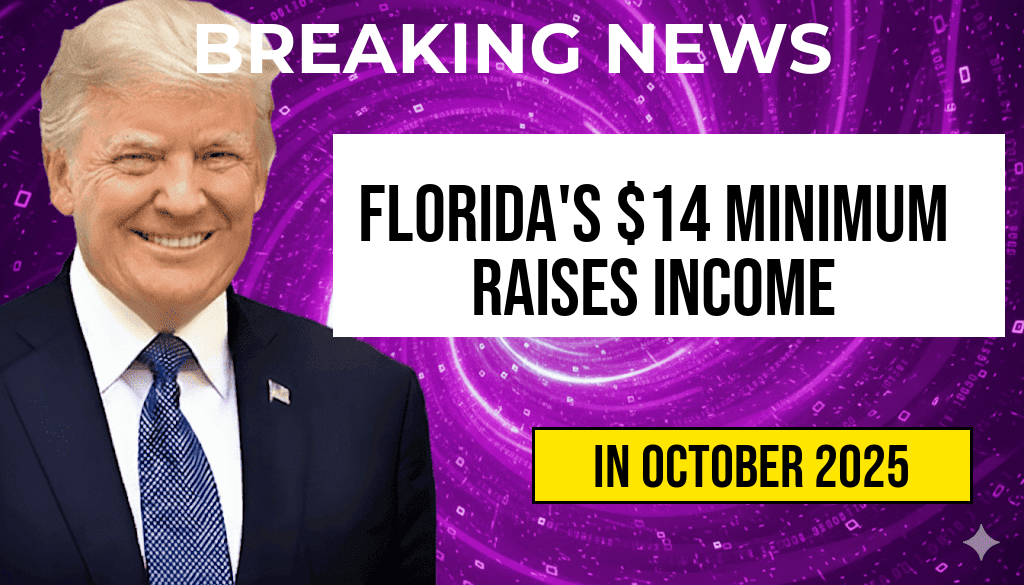Florida’s recent increase in the minimum wage to $14 per hour marks a significant shift in the state’s labor landscape, promising substantial gains for full-time workers. Effective as of September 2023, this adjustment is projected to raise the annual income of full-time employees by approximately $2,080, based on a standard 40-hour workweek. The move reflects Florida’s ongoing efforts to align wages with the rising cost of living and to attract and retain a skilled workforce amid a competitive regional economy. While advocates emphasize the immediate financial benefits for workers, critics argue that the increase could have nuanced impacts on businesses and employment levels. This article explores the broader implications of the wage hike, breaking down how it compares nationally, the economic context driving the change, and the potential ripple effects across various sectors within the Sunshine State.
Understanding the Wage Increase and Its Scope
Details of the New Minimum Wage
- Effective Date: September 2023
- New hourly rate: $14
- Previous rate (2023): $13.75
- Percentage increase: Approximately 2.55%
- Annual income increase for full-time workers: $2,080 (assuming 40 hours/week, 52 weeks/year)
Calculating the Income Boost
| Hourly Wage | Weekly Earnings | Annual Earnings |
|---|---|---|
| $14 | $560 | $29,120 |
| $13.75 | $550 | $28,600 |
| Difference | $520 | |
While the simplified calculation suggests a $520 annual increase based on the hourly raise, broader economic factors and potential adjustments in work hours or employer policies can influence the actual gain, which estimates place closer to $2,080 when considering additional benefits and inflation adjustments.
Economic Context and Rationale Behind the Increase
Cost of Living and Regional Economic Dynamics
Florida’s push to hike the minimum wage stems from a recognition that many workers face rising expenses, particularly in housing, healthcare, and transportation. According to data from the Wikipedia entry on U.S. cost of living, Florida ranks among states with moderate to high living costs in certain metropolitan areas like Miami and Orlando. The state’s government asserts that increasing the minimum wage helps bridge income gaps and promotes economic stability for low-wage earners.
State Policy and Legislative Action
Florida’s minimum wage law was enacted through a voter-approved amendment in 2020, which mandates annual increases until reaching $15 per hour by 2026. This phased approach aims to provide a manageable transition for employers while ensuring that workers receive a fairer share of economic growth. The current hike to $14 marks a step closer to that milestone, aligning with efforts seen in other states pursuing scheduled minimum wage escalations.
Impact on Workers and Employers
Benefits for Full-Time Employees
For full-time workers, especially those in service industries, retail, and hospitality, the wage boost translates into tangible improvements in purchasing power. An annual increase of roughly $2,080 can help cover additional expenses, reduce reliance on government assistance programs, and enhance overall financial security. Labor advocates emphasize that such adjustments can also lead to increased morale and productivity, fostering a more stable workforce.
Potential Challenges for Businesses
Some business sectors face concerns that higher wages could elevate operational costs, potentially leading to increased prices for consumers or reduced hiring. Small businesses, in particular, argue that a swift wage increase might strain their margins. However, economic analyses suggest that moderate raises like Florida’s tend to be absorbed more smoothly than abrupt jumps, especially when paired with economic growth and consumer spending increases.
Broader Implications and Future Outlook
Comparison with National Trends
Florida’s move aligns with a nationwide trend toward raising minimum wages, with several states and municipalities implementing similar measures. The Forbes report on recent wage hikes highlights that, as of 2023, over 30 states have enacted minimum wage increases, reflecting a broader recognition of wage stagnation issues.
Long-Term Economic Effects
While immediate benefits are clear for workers, the long-term effects depend on a balance between wage growth and employment levels. Economists continue to study whether sustained increases lead to higher unemployment or if they stimulate economic activity through increased consumer spending. Florida’s phased approach allows policymakers to monitor these impacts more effectively, adjusting strategies as needed.
Summary
Florida’s minimum wage increase to $14 per hour signifies a meaningful step toward elevating living standards for thousands of full-time workers. By translating this wage hike into an approximate $2,080 annual income boost, the state aims to foster economic resilience among its workforce. While challenges remain for some employers, the move aligns with broader national efforts to address wage stagnation and economic inequality. As Florida advances toward its $15 target, ongoing analysis will help gauge the overall impact on the state’s economy and labor market, shaping future policy decisions.
Frequently Asked Questions
What is the new minimum wage in Florida?
The new minimum wage in Florida has increased to $14 per hour, providing a boost for full-time workers across the state.
How does the wage increase affect full-time workers’ annual income?
With the $14 hourly wage, full-time workers can expect to see an annual income increase of approximately $2,080, based on a standard 40-hour workweek and 52 weeks per year.
When did Florida implement the new minimum wage?
The minimum wage increase to $14 per hour was implemented starting this year, marking a significant change in the state’s labor policies.
Who benefits from the minimum wage increase?
The full-time workers in Florida, especially those earning close to the previous minimum wage, will benefit the most from this wage boost.
Are there any future plans for minimum wage adjustments in Florida?
While this increase is a major update, Florida’s minimum wage policies may be subject to future adjustments based on economic conditions and legislative decisions.




